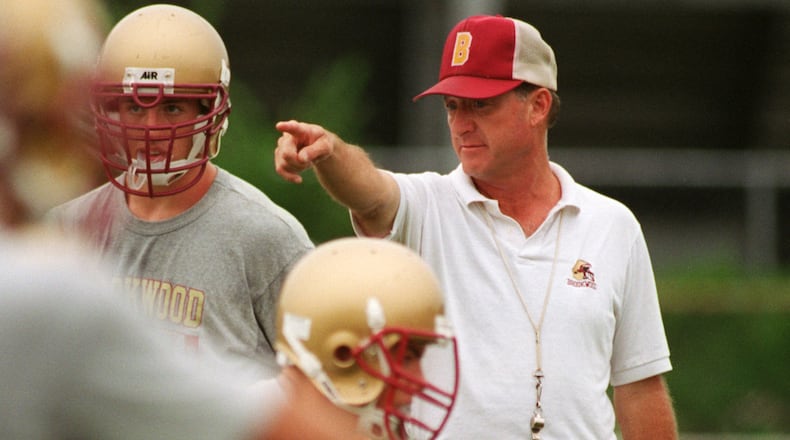Each week, five high school coaches will discuss one issue that affects Georgia high school sports. | Last week: Legislative oversight
At Issue: High school football coaches face undeniable pressures to win, to be couriers for success and stability within a program and to become the face that fan bases love or hate. In addition, they have to manage the general day-to-day operations of a football program, no easy task. In today's day and age — where a Hudl highlight reel clip can create college scholarships and football film is being reviewed before teams hit the showers on Friday nights — the pressures on coaches come from all angles.
So what are the biggest pressures coaches face at the high school level?
The Skinny: Legendary football coach Dave Hunter spent his career molding the bodies and minds of high school athletes for more than 50 years.
He coached at East Cobb Junior High and Ridgeview High School in the late 1960s and early ’70s before coaching at Chamblee and Peachtree. When Hunter took the head coaching job at Brookwood in 1987, he began the longest tenure of his career. In 1996, Hunter led a team that won Gwinnett County’s first state football championship when Brookwood beat Valdosta in the title game.
Hunter’s perspective gained from a lengthy career is unique. His vast knowledge of high school coaching through the decades provides a glimpse on how things were and how they’ve changed.
Hunter: "It has changed. Probably the most pressure I had was put on by me. My expectations were better than most everybody else's, I think. Once you've established a program and have gotten to a certain level, there's just another expectation level ... like if you are supposed to be the best team in Gwinnett or the best team in Atlanta or the best in the state. You expect to get to that point. When we won the state championship in 1996 and then won 13 straight in 1997, the expectation level was that we were supposed to win it again. We lost in the semifinals.
“The pressure in Gwinnett at the time was we had to raise a bunch of money, not just at Brookwood, but most of the schools that were successful were doing it. So there’s pressure to build up your coffers there, too — to build a successful program, to have the best facilities they can have. We built stadiums and fieldhouses and meeting rooms and all kind of stuff, but we had to have the support of the community. So you, as a coach, have to earn that support as the face of the program.
“Part of my big deal was fundraising and building, not just a football program, but an athletic program. All the while I was trying to help my kids with the recruiting. But nowadays, there’s so much movement from one school to the other. You almost have to keep your players from being recruited — your own players. And then (college) recruiting has gotten worse, not better, for the high school coach. It’s just so time-demanding now. Everyone has their own Hudl and Twitter and all that. I don’t know what I would’ve done then. I would have been crazy.
“People in each location, each school, they’re only focused on being a state champion. I'm not saying that’s the only thing going on, but nowadays I think there’s probably a little shorter fuse, for lack of a better word, for the coach to be successful. Back in the day, you might have four or five years. But now, it seems maybe two or three years. One of society's problems is that everyone wants a champion. They don’t want a winner; they want a champion. Some people have the best interest of the program at heart, and some people had the best interests of their kids at heart. Not that the ones who had the best interest of the kids at heart didn’t have an interest in the program, but the program has to come first.”
At Issue: Coaching pressure
• Andy Dyer, Archer football coach • Dave Hunter, former Brookwood football coach • Bryant Appling, Buford football coach • Justin Rogers, Colquitt County football coach • Tim McFarlin, Blessed Trinity football coach » MORE: Previous topics
About the Author
The Latest
Featured

